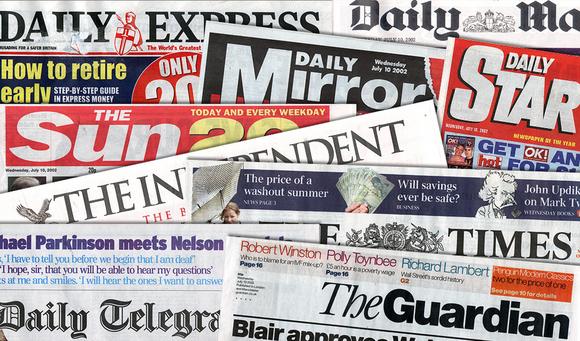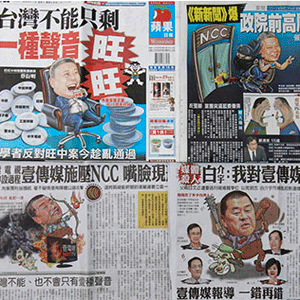3 Apr 2013 | Newswire
Monday (1 April) heralded the return of private daily newspapers to Burma. Since the 1962 Printers and Publishers Registration Act the state has held highly restrictive powers to license newspapers and publishers creating one of the most hostile environments on earth for a free print media. Since the transition period of the past few years began, President Thein Sein has signalled that the government would liberalise restrictions on the media. Prior to the return of daily newspapers, privately-owned weekly journals had begun to flourish as demand for independent news markedly increased. On 1 February this year, the government launched the process to allow the independent media to bid for daily licenses.
Index on Censorship spoke to journalists and proprietors in Burma during a recent mission to the country in March. The return of independent daily newspapers has not been without incident. The government refused to grant licenses for daily publication to a number of publications including the Eleven Media Group, apparently because their application lacked an official revenue stamp valued at 100 kyats ($0.12). This decision was overturned in March and the group will launch its daily newspaper “The Daily Eleven” symbolically on World Press Freedom Day on May 3 according to AP.
Previously news was published in weekly journals that reviewed news and politics and had to submit all their proofs to the Press Scrutiny and Registration Division (PSRD) prior to publication (hence weekly publication). According to state journal the New Light of Myanmar, the termination of the PSRD was signed off at the cabinet meeting of 24 January 2013. Though ominously, the report claimed a new “Copyrights and Registration Division” would be formed under the Information and Public Relations Department.
Index on Censorship views the licensing of newspapers as an unwarranted restriction on freedom of the media. The registration process for daily newspapers in Burma has been particularly restrictive with the application requiring a code of practice, a code of ethics and a code of conduct for the publication — even though the Press Council is working on a series of ethical codes for journalists as part of its on-going negotiations to draft a more proportionate press law.
One editor told Index he had applied for a press license on 21 February and had not yet heard of the result by 13 March. The application was over 80 pages in total and the local authorities stated the application needed to be in both Burmese and English. Journalists told Index several questions on the application for a daily newspaper license concerned the previous political activities of the applicant, which raised concerns that political considerations will be taken into account when awarding the limited number of licenses proposed.
Further advances in media freedom are expected in the coming months, with foreign journalists to be given working visas from mid-April (rather than taking the risk of a tourist visa as is the norm now) and the BBC hoping to broadcast its global news channel in Burma later this year. Reporters Without Borders has moved Burma’s ranking in its Press Freedom Index up 18 places to 151 out of 179 countries.
Yet, old habits die hard. On the first day of new daily newspapers, the government kept the independent media at arm’s length from an official state visit by the President of Singapore Tony Tan Keng Yam with only the official state media allowed into the press conference surrounding the trip. A forthcoming Index report into the state of freedom of expression in Burma will examine these trends in further detail.
3 Apr 2013 | Uncategorized
Monday (1 April) heralded the return of private daily newspapers to Burma. Since the 1962 Printers and Publishers Registration Act the state has held highly restrictive powers to license newspapers and publishers creating one of the most hostile environments on earth for a free print media. Since the transition period of the past few years began, President Thein Sein has signalled that the government would liberalise restrictions on the media. Prior to the return of daily newspapers, privately-owned weekly journals had begun to flourish as demand for independent news markedly increased. On 1 February this year, the government launched the process to allow the independent media to bid for daily licenses.
Index on Censorship spoke to journalists and proprietors in Burma during a recent mission to the country in March. The return of independent daily newspapers has not been without incident. The government refused to grant licenses for daily publication to a number of publications including the Eleven Media Group, apparently because their application lacked an official revenue stamp valued at 100 kyats ($0.12). This decision was overturned in March and the group will launch its daily newspaper “The Daily Eleven” symbolically on World Press Freedom Day on May 3 according to AP.
Previously news was published in weekly journals that reviewed news and politics and had to submit all their proofs to the Press Scrutiny and Registration Division (PSRD) prior to publication (hence weekly publication). According to state journal the New Light of Myanmar, the termination of the PSRD was signed off at the cabinet meeting of 24 January 2013. Though ominously, the report claimed a new “Copyrights and Registration Division” would be formed under the Information and Public Relations Department.
Index on Censorship views the licensing of newspapers as an unwarranted restriction on freedom of the media. The registration process for daily newspapers in Burma has been particularly restrictive with the application requiring a code of practice, a code of ethics and a code of conduct for the publication — even though the Press Council is working on a series of ethical codes for journalists as part of its on-going negotiations to draft a more proportionate press law.
One editor told Index he had applied for a press license on 21 February and had not yet heard of the result by 13 March. The application was over 80 pages in total and the local authorities stated the application needed to be in both Burmese and English. Journalists told Index several questions on the application for a daily newspaper license concerned the previous political activities of the applicant, which raised concerns that political considerations will be taken into account when awarding the limited number of licenses proposed.
Further advances in media freedom are expected in the coming months, with foreign journalists to be given working visas from mid-April (rather than taking the risk of a tourist visa as is the norm now) and the BBC hoping to broadcast its global news channel in Burma later this year. Reporters Without Borders has moved Burma’s ranking in its Press Freedom Index up 18 places to 151 out of 179 countries.
Yet, old habits die hard. On the first day of new daily newspapers, the government kept the independent media at arm’s length from an official state visit by the President of Singapore Tony Tan Keng Yam with only the official state media allowed into the press conference surrounding the trip. A forthcoming Index report into the state of freedom of expression in Burma will examine these trends in further detail.
15 Feb 2013 | Leveson Inquiry, Media Freedom, News and features, United Kingdom
Index on Censorship opposes recommendations for the statutory underpinning of press regulation
 (more…)
(more…)
24 Dec 2012 | Uncategorized
 The $600m sale of Next Media, one of Taiwan’s most popular media companies, has raised the spectre of a media monopoly that could be disastrous for press freedom on the island. Ching-Yi Liu and Weiping Li report (more…)
The $600m sale of Next Media, one of Taiwan’s most popular media companies, has raised the spectre of a media monopoly that could be disastrous for press freedom on the island. Ching-Yi Liu and Weiping Li report (more…)


 The $600m sale of Next Media, one of Taiwan’s most popular media companies, has raised the spectre of a media monopoly that could be disastrous for press freedom on the island. Ching-Yi Liu and Weiping Li report
The $600m sale of Next Media, one of Taiwan’s most popular media companies, has raised the spectre of a media monopoly that could be disastrous for press freedom on the island. Ching-Yi Liu and Weiping Li report